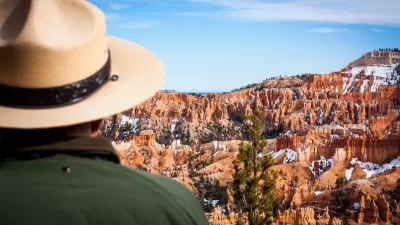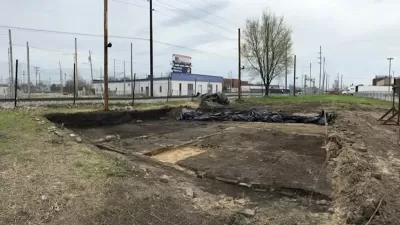Yosemite National Park officials released a revised draft of the Merced River Plan. An earlier of the controversial plan would have restricted recreation and removed swimming pools from the national park's famed hotels.
"In a major reversal, Yosemite National Park officials have dropped controversial plans to ban a wide variety of recreational activities in Yosemite Valley, including ending bike and raft rentals and tearing out swimming pools at the Yosemite Lodge and famed Ahwahnee Hotel," reports Paul Rogers.
The proposed Merced River Plan walks the fine line of park and open space protection: how to protect the natural conditions of watersheds, meadows, and wildlife habitat, while also providing access to the public, in accordance with the democratic ideals of the National Park System.
Rogers details the revised plan, which includes the following measures:
- Restoring 189 acres of meadows in Yosemite Valley.
- Increasing the number of Yosemite parking spaces by 8 percent
- Increasing the number of campsites in Yosemite Valley from 466 to 640.
- [The] historic Sugar Pine stone bridge, built in 1928 and located behind the Ahwahnee Hotel, will also not be removed -- as had been proposed to control erosion. Instead, parks officials will launch an engineering study to determine how to keep the bridge and reduce erosion."
In response to the previous plan, Rep. Tom McClintock, R-Granite Bay, whose district includes Yosemite provided the following soundbite in opposition of the plan's restrictions: "The Park Service is hanging out a 'Tourists Go Home' sign."
FULL STORY: Yosemite National Park drops plans to ban bike and raft rentals

Maui's Vacation Rental Debate Turns Ugly
Verbal attacks, misinformation campaigns and fistfights plague a high-stakes debate to convert thousands of vacation rentals into long-term housing.

Planetizen Federal Action Tracker
A weekly monitor of how Trump’s orders and actions are impacting planners and planning in America.

In Urban Planning, AI Prompting Could be the New Design Thinking
Creativity has long been key to great urban design. What if we see AI as our new creative partner?

King County Supportive Housing Program Offers Hope for Unhoused Residents
The county is taking a ‘Housing First’ approach that prioritizes getting people into housing, then offering wraparound supportive services.

Researchers Use AI to Get Clearer Picture of US Housing
Analysts are using artificial intelligence to supercharge their research by allowing them to comb through data faster. Though these AI tools can be error prone, they save time and housing researchers are optimistic about the future.

Making Shared Micromobility More Inclusive
Cities and shared mobility system operators can do more to include people with disabilities in planning and operations, per a new report.
Urban Design for Planners 1: Software Tools
This six-course series explores essential urban design concepts using open source software and equips planners with the tools they need to participate fully in the urban design process.
Planning for Universal Design
Learn the tools for implementing Universal Design in planning regulations.
planning NEXT
Appalachian Highlands Housing Partners
Mpact (founded as Rail~Volution)
City of Camden Redevelopment Agency
City of Astoria
City of Portland
City of Laramie





























